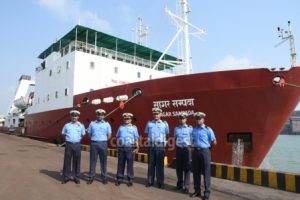India’s Sagar Sampada Needs Replacement
Sagar Sampada is still functioning to the satisfaction of the Indian Oceanographers.
Thanks to the untiring efforts of the concerned managers and support staffs, India’s 36-year old Fishery Oceanographic Research Vessel (FORV) Sagar Sampada is still functioning to the satisfaction of the Indian Oceanographers. However, the vessel has far outlived her economic life in terms of Shipping Industry Standards. In view of this, The Ministry of Earth Sciences (MoES) has been advised to go for a replacement of Sagar Sampada with a modern state-of-the-art research vessel which would equip Centre for Marine Living Resources and Ecology (CMLRE) to provide precise data and information required for timely intervention on environmental impacts, biochemistry, fishery resources and other biological aspects in the Indian Exclusive Economic Zone (EEZ) .
to the satisfaction of the Indian Oceanographers. However, the vessel has far outlived her economic life in terms of Shipping Industry Standards. In view of this, The Ministry of Earth Sciences (MoES) has been advised to go for a replacement of Sagar Sampada with a modern state-of-the-art research vessel which would equip Centre for Marine Living Resources and Ecology (CMLRE) to provide precise data and information required for timely intervention on environmental impacts, biochemistry, fishery resources and other biological aspects in the Indian Exclusive Economic Zone (EEZ) .
Formulation of a policy/approach to understand and manage our oceans for sustainable development of living resources is a challenging task. A state-of-the-art new research vessel would help expand the scope of the ocean research on ecology assessment, living resource surveys and other biogeochemistry studies,resulting in empowering India and her people in harnessing the ocean wealth diligently.
Fisheries Ocean Research Vessel (FORV) Sagar Sampada is owned by the Ministry of Earth Sciences (MoES) and managed by its Center for Marine Living Resources and Ecology (CMLRE), Kochi to strengthen marine life sciences in India since 1984.
Also Read : India’s Gains and Losses in the Enrica Lexie Case
CMLRE, Kochi is an attached office of the MoES providing world-class oceanography research facilities to the researchers, teachers and students helping them achieve many milestones in the field of marine fishery/ecology, biology, biogeochemistry, and deep-sea ecosystems research. CMLRE scientists have been surveying oceanic areas for new species of marine animals using FORV Sagar Sampadaand recorded three nematodes, two polychaetes, one echinoderm, over 15 fishes, many species of sea spiders and crabs so far which revealed new information on these species. A continued effort is certainly going to add many more such new species/records from India’s Exclusive Economic Zone (EEZ) including other parts of the Oceans.
The present vessel Sagar Sampada has an accommodation capacity for up to 35 crew and 22 scientists for performing a multidisciplinary surveys in biological, Physical, Meteorological, Chemical, Oceanographic exploration activities in the Bay of Bengal, Arabian Sea and other parts of the oceans with the participation of various CSIR, ICAR and other foreign institutions.(India Science Wire)
(Slider Image by Nitant Raut)
